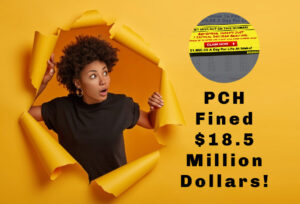Did Publishers Clearing House Scam Its Sweepstakes Entrants? | ESG

The FTC has levied an $18.5 million fine to Publishers Clearing House for running a deceptive sweepstakes.
Why Does The Federal Trade Commission Care About Sweepstakes?
The Federal Trade Commission (FTC) is responsible for promoting fair and competitive business practices, protecting consumers from deceptive and unfair actions, and enforcing laws related to advertising, antitrust, and consumer protection. As a promotional marketing agency, ESG is thoroughly fluent in the demands of the FTC, so we make sure our clients never find themselves in a position where they are paying costly fines or banned from running games of chance in the future.
What Did Publisher’s Clearing House Do Wrong?
The official complaint against Publisher’s Clearing House (PCH) said the company used “dark patterns” to mislead the public about how to enter their sweepstakes. They advertised their sweepstakes in a way that made it seem like people had to purchase something from them to be eligible to win. People also felt like their chances of winning would increase if they made a purchase.
Additionally, the “risk-free” ordering was misleading due to shipping and handling fees that increased the product price by 40%. Further, PCH misrepresented how the personal data it obtained was going to be used. Even the email subject lines PCH sent to consumers were deceptive and misleading because they made it sound like the email was an official tax document or requirement (it was not). Deceptive email practices like this violate the CAN-SPAM Act of 2003. The FTC provides clear guidelines for how to abide by the CAN-SPAM Act here.
Regulatory agencies are tasked with protecting the public and they pay special attention to older generations and lower-income sectors of the population who are especially susceptible to business schemes and fraud. The FTC’s investigation also found that many of the consumers affected by PCH’s misdeeds were in one of these two consumer groups.
What Was The Final Outcome of the Publishers Clearing House Scam Case?
First, PCH has to pay $18.5 million to consumers who were affected/preyed upon. Consumers who have been affected can learn how the collection process works here.
Second, PCH must make changes to how it conducts business. You can read more here, but below are several of the new measures it must take:
- Clearly delineate entry forms from order forms (no sales messaging allowed on sweepstakes entry form pages)
- Beef up their “No Purchase Necessary” messaging which might require an acknowledgement via a checkbox on the entry form stating that the consumer understands ordering a magazine won’t improve their chances of winning
- Be transparent about all the fees for a purchase before the purchase is made
- Use transparent subject lines in emails
- Destroy consumer data collected prior to January 1, 2019 (Ouch! In a world where data is everything, this one hurts.)
How Brands Can Protect Themselves From Running Illegal Sweepstakes
We can’t speak to the intentions of PCH regarding how they structured their sweepstakes, but as a promotional agency, we talk to many clients who are not aware that some sales and marketing tactics can be seen as deceptive – especially if a sweepstakes is a component of the advertising/marketing strategy. The good news is avoiding accidentally running an illegal lottery is fairly easy to do. Simply follow these three guiding principles:
- No Purchase Necessary: Don’t require a purchase for entry or additional entries without also providing a free way to obtain the same number of entries. Make sure the free method of entry has equal dignity in your calls to action.
- Odds of Winning: Don’t do anything that could change the odds of winning after the promotion starts such as changing the entry dates or the number of prizes being offered.
- Prizes: Award all of them without requiring payment from any winner.
How Consumers Can Protect Themselves From Being a Victim Of An Illegal Sweepstakes
If you are a consumer, keep in mind that a purchase-only method of entry into a sweepstakes is illegal. You also should never have to pay a fee for the chance to win something (unless you are entering a state-run lottery or legitimate charitable raffle). Taxes will need to be paid by you if the value of the prize you won is $600 or more because prizes are additional miscellaneous income in the United States. This is why winners complete a W9 Form and are issued a 1099 for the approximate retail value of the prize. Any monies you have to pay based on your tax bracket are solely between you, your accountant/accounting software, and Uncle Sam – legitimate winners of a sweepstakes open to U.S. residents and sponsored by a U.S. company will never have to send money to the sponsor.
